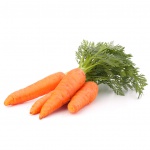 Daucus Carota L. Belongs to the Apiaceae family (Umbelliferae) and both the plant and its edible part are referred to as carrot. It is a biennial plant characterised by presenting a deep ramified root; solid, grooved, hairy and floriferous stem 30-100 cm. tall. Compound leaves, pinnate, and white umbelliform inflorescences with a dark maroon central flower. Flowering occurs in summer. The fruit is an achene covered with brown thorns. During the first year the plant develops the edible part, its main root, and during the second year it ferments the seeds.The carrot is native to Europe and Asia and grows on semi-dry, sandy and adjacent to the sea. Its harvest has experienced an important growth in the last years, both in extension and in production, becoming one of the most produced plants in the world. Asia is the largest producer followed by Europe and the USA. Carrot oil is an oily extract that is obtained by macerating Daucus carota roots in sunflower oil (Helianthus Annuus). Carrots are a natural source of carotenoids . Carotenoids are multi-coloured compounds that occur naturally and that are abundant as pigments in plants. Carrots are rich in carotenoids, which are mainly responsible for its colour. The predominant carotenoids are β-carotenes (45-80%), α-carotenes (15-40%) and γ-carotenes (2-10%). Carotenoids provide anti-aging activity because they are precursors of vitamin A.
Daucus Carota L. Belongs to the Apiaceae family (Umbelliferae) and both the plant and its edible part are referred to as carrot. It is a biennial plant characterised by presenting a deep ramified root; solid, grooved, hairy and floriferous stem 30-100 cm. tall. Compound leaves, pinnate, and white umbelliform inflorescences with a dark maroon central flower. Flowering occurs in summer. The fruit is an achene covered with brown thorns. During the first year the plant develops the edible part, its main root, and during the second year it ferments the seeds.The carrot is native to Europe and Asia and grows on semi-dry, sandy and adjacent to the sea. Its harvest has experienced an important growth in the last years, both in extension and in production, becoming one of the most produced plants in the world. Asia is the largest producer followed by Europe and the USA. Carrot oil is an oily extract that is obtained by macerating Daucus carota roots in sunflower oil (Helianthus Annuus). Carrots are a natural source of carotenoids . Carotenoids are multi-coloured compounds that occur naturally and that are abundant as pigments in plants. Carrots are rich in carotenoids, which are mainly responsible for its colour. The predominant carotenoids are β-carotenes (45-80%), α-carotenes (15-40%) and γ-carotenes (2-10%). Carotenoids provide anti-aging activity because they are precursors of vitamin A.
